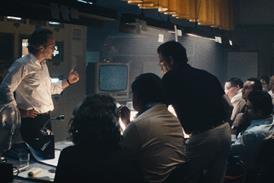Over the past three years, digital cinema has finally become a reality for a growing number of exhibitors and distributors around the world. And although the global credit crunch has slowed the industry's conversion from 35mm prints and projection, Jack Kline still has his sights set firmly on the digital future.
As president and COO of Christie Digital Systems USA, a leading supplier of digital projection systems, Kline is looking to exploit new opportunities in the international marketplace and, particularly, digital 3D.
'The model has changed, temporarily,' says Kline from Christie's headquarters in the Southern California city of Cypress. 'We still have the studios very much committed to the platform and we've shown that it works.' Now, he adds, with increasing audience interest in 3D versions of the latest feature releases, 'the exhibitor can make incremental revenue. There is a return on his investment. If he buys a digital system himself, he can sell tickets at a higher price.'
Christie, a subsidiary of Japanese optical technology company Ushio, helped kick-start the digital transition five years ago when Kline and a colleague proposed to the Hollywood majors that 'it had to be driven at the studio level first'.
Through a funding plan venture with Access Integrated Technologies, Christie was involved in some of the largest-scale early digital cinema installations and to date the company has installed systems on around 5,300 US screens, giving it an 80% market share. Globally, it accounts for 7,500-8,000 screens, says Kline, giving the company a market share of more than 60%.
The scarcity of investment capital has recently made large-scale deployments in the US all but impossible to finance. But Christie has continued to work on smaller installations elsewhere in the world, such as the 80-screen Arts Alliance Digital Cinema project in the UK, a 200-projector contract with India's Scrabble Entertainment, and two initiatives in China.
The business models vary, Kline reports: 'In some areas of the world you have government-supported plans that are trying to change individual countries from analogue to digital. In other areas you have exhibitors who have banded together in groups that will convert and then collect revenues from Hollywood. You've got some individual investors that are willing to invest and you've got some vendor-financed plans.'
Kline is confident that 'when the credit markets loosen up we can get back to large-scale deployments'. In the meantime, though, he is looking to the industry's expanding slate of 3D releases - among them Focus' release Coraline, Disney's upcoming Jonas Brothers: The 3D Concert Experience and DreamWorks/Paramount's Monsters Vs Aliens - to spur growth.
'We're very encouraged with what we're seeing now with 3D,' he says. 'It's providing incremental revenue, it's helping the studios and it's keeping digital cinema moving forward.'



















No comments yet